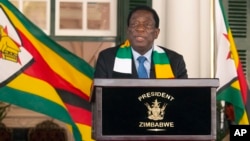Zimbabweans recently went to the polls to elect a new president. Although the Zimbabwe Election Commission announced that incumbent Emmerson Mnangagwa won the election, multiple observation missions have expressed deep concern and stated that the country’s electoral process did not meet regional and international standards for credibility.
Indeed, the Southern African Development Community and other international electoral observation missions cited problems with transparency, independence, fairness, and credibility at all stages of the electoral process.
The United States notes in particular the systemic bias against political opposition during the pre-election period and reports from respected civil society groups that Election Commission officials pressured election observers to sign altered polling station result forms. “We call on the [Zimbabwe Election Commission] to make the disaggregated polling station results publicly available to increase confidence in the result tabulation process,” said State Department spokesperson Matthew Miller in a statement.
The United States is committed to the people of Zimbabwe and their right to choose their leaders in free and fair elections conducted in a transparent manner. “We commend those who sought to exercise their right to vote peacefully,” said spokesperson Miller. He went on to “strongly condemn the intimidation and disruption of lawful election observers throughout the electoral period.”
On August 23, the Zimbabwean government arrested staff from respected civil society organizations engaged in lawful election observation. These arrests prevented efforts to independently verify the Election Commission’s announced results, a fundamental component of democratic processes in the region and around the world. “Furthermore, threats directed against members of the [Southern African Development Community] Electoral Observation Mission are dangerous,” said spokesperson Miller, “and we call upon the government of Zimbabwe to cease these inflammatory and unacceptable attacks.”
These actions belie President Mnangagwa’s repeated pledges to respect rule of law, transparency, and accountability. The United States is engaging with regional leaders to discuss their efforts to reengage the Zimbabwean government.
“There is much at stake for the people of Zimbabwe and the region,” said spokesperson Miller. “We urge all Zimbabweans to remain peaceful and pursue grievances through established legal channels.”














